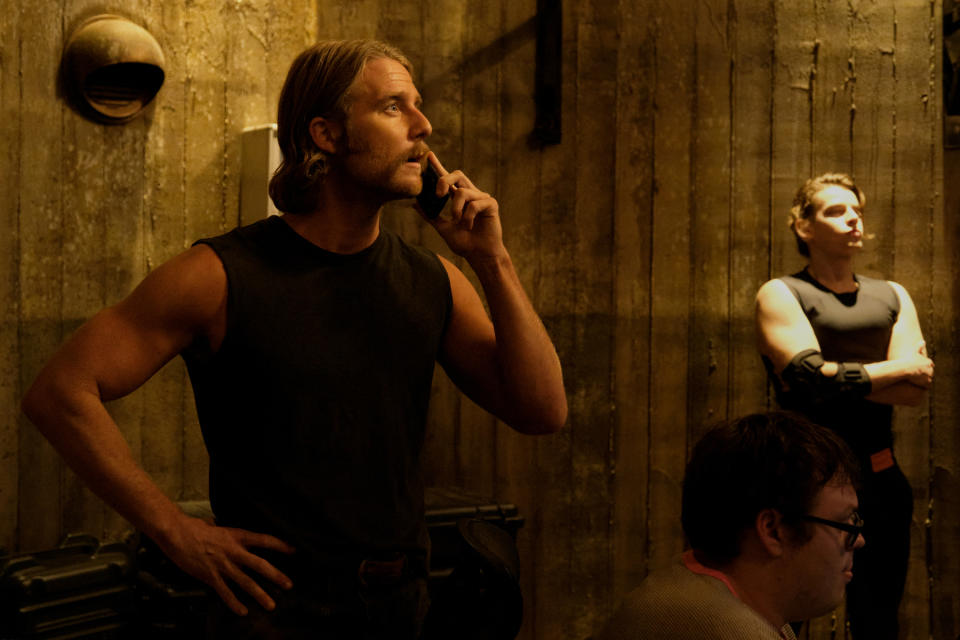‘Mrs. Davis’ Is a Bonkers Vision of Our AI-Controlled Future
- Oops!Something went wrong.Please try again later.
- Oops!Something went wrong.Please try again later.
- Oops!Something went wrong.Please try again later.

Midway through the second episode of the new Peacock series Mrs. Davis, vengeful nun Simone asks her rodeo cowboy ex Wiley to help her make sense of the events of the show up to that point. “Don’t underestimate how stupid this gets, sweetheart,” he warns her.
It is almost impossible to overstate just how stupid Mrs. Davis gets — much to its credit. This is an epically, delightfully dumb show. It has a lot of ambition, and a lot of big ideas, but it can’t resist going for the broadest, strangest, silliest jokes at every turn, to the point where it may be a more ridiculous dramatization of the quest for the Holy Grail than the one featuring the guys from Monty Python. The series constantly feels at war with itself creatively, as if no one involved — including its co-creators, longtime Big Bang Theory and Young Sheldon writer Tara Hernandez, and Lost/Leftovers/Watchmen producer Damon Lindelof — quite knows exactly what they are making, or at least how to make what they want. But it’s fascinating, charming, frequently hilarious, and at times surprisingly moving to watch them try.
More from Rolling Stone
Viral Drake and The Weeknd AI Collaboration Pulled From Apple, Spotify
Nine Essential Steps Professionals Can Take to Stay Relevant in an AI-Dominated World
With the New 'Harry Potter' TV Series Announced, Here's Where to Stream the Entire Franchise Online
Mrs. Davis practically defies description, but I’ll give it a shot. The show takes place in a present-day world largely like our own, but with one key difference: an algorithm called Mrs. Davis has become the single most powerful and influential force on earth, having allegedly cured all of our social ills. “There is no famine or war,” one of her billions of acolytes explains to a man who was stranded on a desert island during Mrs. Davis’ rise. “All who want a job have one. She has united and healed all of us, and given purpose to the purposeless. The world was broken. But the algorithm fixed it.”
Both drama and comedy — and Mrs. Davis offers generous helpings of both — require some sort of tension to function. The utopia promised by that monologue would seem to lack any reason for tension. But of course, seemingly perfect worlds tend to be anything but, and we soon discover a wide swath of people who take no pleasure in the reality the show’s title character has created. Simone (played by Betty Gilpin from GLOW) has a deeply personal reason for hating the algorithm. Wiley (Jake McDorman) is part of an underground resistance movement filled with pumped-up bros who quote Fight Club unironically and feel emasculated by the control Mrs. Davis exerts over their lives. Along the way, we also find out that magicians, poker players, the Knights Templar, and certain influential sectors of the Catholic Church all have a bone to pick with her.

Somehow, this results in Simone and Wiley reuniting to seek the Grail, both on Mrs. Davis’ behalf and as a way to destroy her. It’s complicated and strange, but then almost everything about the show is. Within the opening five minutes, we see a group of medieval nuns and knights dismember one another in a battle for the Grail. Later installments include a papal doppelganger, a rabid and homicidal sperm whale, an examination of what exactly it means to be a bride of Christ, and a heist where someone utters the phrase, “Damn you, Constipator!” — and it makes sense in context! Episodes often end with Simone utterly baffled by the direction her story has taken, and it’s hard to blame her.
Yet Mrs. Davis is at least as entertaining as it is inexplicable. Watching its seemingly mismatched pieces strain to fit together is more appealing in many ways than watching other current series go about their business in more coherent and consistent fashion.
At the heart of all this confusion and nonsense may be its unlikely team of co-creators. Hernandez comes from a more pure comedy world, though Young Sheldon frequently tugs at the heartstrings. Lindelof, meanwhile, has always had a mischievous streak, but one he tends to use as a release valve to keep his shows from feeling too bleak. So The Leftovers was a meditation on grief that also had room for the President of the United States to prove his identity by placing his penis on a shelf to be weighed and measured, while Watchmen’s intense study of racism in America also featured Jeremy Irons repeatedly, defiantly, farting while imprisoned on a moon of Jupiter. (Oh, and Jean Smart longingly caressing a giant metallic blue space dildo.)
Mrs. Davis has a lot of big ideas about religion, technology, and corporate branding, and how easy it is to conflate them all in modern life. And it has a genuinely emotional story at its core, about the traumas of Simone’s childhood, and her complicated relationship with Jay (Andy McQueen), a short-order diner cook who isn’t quite what he seems. Mostly, though, its heart seems to be in its gags, which are wonderful enough to justify how frequently the comedic tail seems to be wagging the thematic dog. Whatever Hernandez and Lindelof’s actual working relationship was, the show plays like a creative tug of war where her sensibilities eventually won out(*), probably ultimately to everyone’s benefit. There is perhaps a more tonally balanced version of Mrs. Davis that manages to give equal weight to both the self-parody of strutting rebel leader JQ (Chris Diamantopoulos, hilarious) and to its discussions of faith in God versus faith in technology. And maybe that’s a great show. But there is something that feels right and on-topic for this one to be so sprawling and messy and unsure of itself — as if it’s siding with Simone and Wiley’s desire for the unpredictable highs and lows of chaos over the reassuring middle ground of order.
(*) There are even multiple jokes at the expense of Lindelof’s TV ouevre, including one about hatches, as well as a scene where someone warns Simone and Wiley that they will probably regret seeking answers to the show’s many mysteries. For what it’s worth, the series tries explaining everything, with mixed results — often because it’s more focused on punchlines than clarity. But the punchlines are really good, including two of the biggest laughs any TV show has given me in years.
Or maybe the creators just started tuning into the peculiar, enormously appealing frequency of Betty Gilpin’s lead performance. She is asked to shoulder an enormous and varied workload. Simone is at different points an incredulous audience surrogate, a tragic heroine, and a comic force of nature, often shifting from one to the next within a few heartbeats. She is incredibly watchable, providing a necessary dramatic anchor as the story floats up to ever-more-ludicrous new heights, but also going humorous toe to humorous toe with a bunch of really funny performances from McDorman, Diamantopoulos, Elizabeth Marvel (as Simone’s disapproving mother), Katja Herbers (as the leader of a pantsuit-clad group of women who protect the Grail), Margo Martindale (as the mother superior of Simone’s idealized, jam-making convent), and more. Amidst all this globe-trotting insanity, playing a character whose middle name is literally Danger, she seems utterly real, in addition to always having the perfect exasperated response to her latest circumstance.
Simone, we learn, was raised by magicians, and was giddy to be part of her parents’ act. (David Arquette plays her showman father.) As an adult, she has extremely mixed feelings about the family business, but she still knows all the tricks of the trade, including how to get out of a pair of handcuffs at a moment’s notice. Mrs. Davis in many ways feels like a magic trick. Because of Lindelof and that premise about AI running the world, it sets you up to expect something relatively high-minded, and instead gives you the live-action equivalent of Duck Amuck. (It does not feel like a coincidence that Simone’s ex shares a name with a self-destructive coyote.) And then just when you’ve accepted Wiley’s advice about the stupidity of it all, it manages to hit you in the feelings.
Peacock is referring to Mrs. Davis as an ongoing series, which is almost as much of a surprise as the tone of the show. The eighth episode so effectively wraps up all the various stories and big ideas that it’s hard to imagine what a second season would be about. But maybe that’s the next trick that Hernandez and Lindelof have hidden up their sleeves?
The first four episodes of Mrs. Davis begin streaming April 20 on Peacock, with additional episodes releasing weekly.
Best of Rolling Stone

